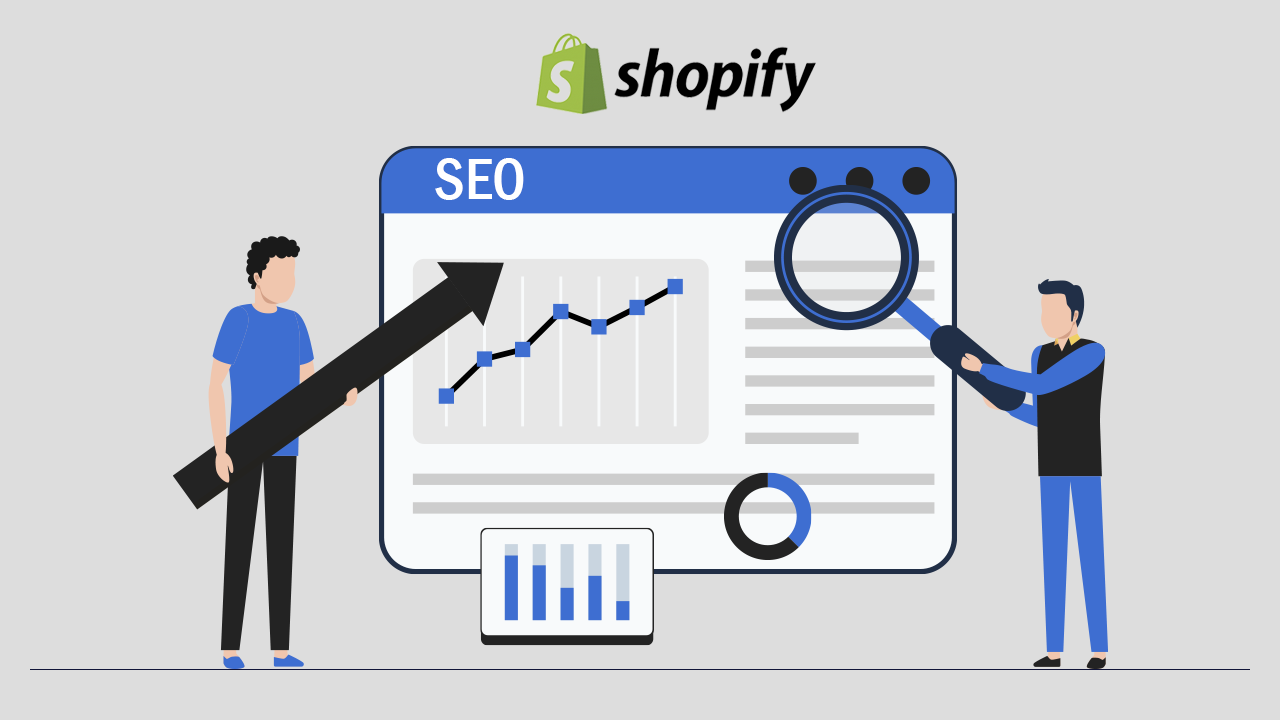From Clicks to Conversions: Shopify SEO Strategies

Shopify has emerged as one of the leading platforms for creating and managing online stores. However, simply having a store is not enough to succeed in the competitive online marketplace. To drive traffic, increase visibility, and boost sales, it is essential to implement effective SEO strategies tailored specifically for stores.
Table of Contents
- Understanding Shopify SEO:
- Keyword Research for Shopify SEO:
- On-Page Optimization:
- Technical SEO for Shopify:
- Content Marketing for Shopify:
- Link Building and Off-Page SEO:
- Local SEO for Shopify:
- Measuring and Analyzing Shopify SEO Performance:
- Tips for E-commerce Success with Shopify:
- Conclusion:
- Frequently Asked Questions (FAQs):
Understanding Shopify SEO:
What is Shopify?
Shopify is a popular and user-friendly e-commerce platform that enables entrepreneurs and businesses to set up their online stores quickly and easily. With a wide range of customizable templates, secure payment gateways, and built-in SEO features, Shopify provides a comprehensive solution for selling products online.
What is SEO?
SEO, or Search Engine Optimization, is the practice of optimizing a website to rank higher in search engine results. When a potential customer searches for products or services relevant to a Shopify store, can help the store appear on the first page of search results, driving organic traffic and potential customers to the site.
Importance of SEO for Shopify:
Implementing for Shopify is vital for several reasons. Firstly, it increases the store’s visibility, ensuring that it reaches a broader audience and potential customers. Secondly, helps stores build credibility and trust with search engines and users alike. Finally, higher search engine rankings result in more clicks, traffic, and ultimately, conversions.
Keyword Research for Shopify SEO:
Identifying relevant keywords:
Keyword research is the foundation of any successful strategy. Understanding what keywords potential customers use when searching for products or services offered by a store is crucial. There are various tools available, such as Google Keyword Planner, that can help identify relevant keywords with a high search volume and low competition.
Long-tail keywords for targeting:
In addition to generic keywords, long-tail keywords should be a focus EO. Long-tail keywords are more specific and have lower search volumes but higher conversion rates. By targeting long-tail keywords, Shopify stores can attract customers who are closer to making a purchase decision.
On-Page Optimization:
Creating compelling product titles and descriptions:
The product titles and descriptions should be optimized with relevant keywords to improve their visibility in search results. However, it’s essential to ensure that the content remains engaging, informative, and enticing to potential customers.
Utilizing meta tags and URLs:
Meta tags, including meta titles and meta descriptions, play a crucial role in conveying the content’s relevance to search engines and users. Additionally, using clean and descriptive URLs enhances the overall.
Image optimization:
High-quality images can enhance the overall shopping experience on a Shopify store, but they should also be optimized. Using descriptive alt text and image file names can help search engines understand the content of the images, further improving the store’s visibility in image search results.
Technical SEO for Shopify:
Site structure and navigation:
A well-organized site structure and user-friendly navigation are essential for both search engines and website visitors. A clear and logical hierarchy allows search engines to crawl and index the site efficiently.
Mobile responsiveness:
With an increasing number of users accessing the internet through mobile devices, having a mobile-responsive Shopify store is crucial. Mobile-friendly websites are favored by search engines and provide a better user experience, leading to increased engagement and conversions.
Page speed optimization:
Page speed is a critical factor in SEO. Slow-loading pages can lead to higher bounce rates and lower search engine rankings. Optimizing page speed through various techniques, such as image compression and caching, is essential for Shopify success.
Content Marketing for Shopify:
Blogging for SEO:
Maintaining a blog on the can be an effective content marketing strategy. Regularly publishing informative and relevant blog posts can attract organic traffic, engage potential customers, and establish the store as an authoritative source in its niche.
Product reviews and user-generated content:
Encouraging customers to leave product reviews and share their experiences can contribute to the store’s efforts. User-generated content not only adds credibility but also provides valuable keywords and phrases for search engines to crawl.
Link Building and Off-Page SEO:
Building high-quality backlinks:
Earning backlinks from reputable and authoritative websites is a powerful way to improve a Shopify store’s. Guest posting, influencer outreach, and participating in industry-related forums are effective methods of building valuable backlinks.
Social media marketing for Shopify:
Social media platforms can play a significant role in driving traffic. Engaging with followers, sharing valuable content, and promoting products can increase brand visibility and attract potential customers.

Local SEO for Shopify:
Optimizing for local searches:
If a Shopify store has physical locations, optimizing for is essential. This includes providing accurate and consistent business information across various online directories and local search platforms.
Google My Business listing:
Creating and optimizing a Google My Business listing can significantly impact. It allows the store to appear in local search results, Google Maps, and provides valuable information to potential customers.
Measuring and Analyzing Shopify SEO Performance:
Google Analytics:
Google Analytics is a powerful tool for monitoring website traffic, user behavior, and conversions. By analyzing the data, store owners can identify areas for improvement and adjust their strategies accordingly.
Tracking conversions and sales:
Ultimately, the success of is measured by the number of conversions and sales generated. Implementing conversion tracking tools helps determine which efforts are most effective in driving conversions.
Tips for E-commerce Success with Shopify:
User experience and conversion rate optimization:
A seamless and user-friendly shopping experience is crucial for converting visitors into customers. Optimizing the checkout process, providing multiple payment options, and ensuring secure transactions are essential for e-commerce success.
Staying updated with SEO trends:
SEO is an ever-evolving field, with search engines frequently updating their algorithms. Staying informed about the latest trends and best practices is crucial for maintaining a competitive edge.
Conclusion:
In conclusion, effective play a pivotal role in transforming clicks into conversions. By implementing a comprehensive plan, owners can drive targeted traffic, increase visibility, and ultimately boost sales. Understanding the importance of keyword research, on-page optimization, technical, content marketing, link building, and can lead to a successful online presence and a thriving e-commerce business.
With user-friendly platform and a solid strategy in place, entrepreneurs and businesses can overcome the challenges of the digital landscape and achieve remarkable results. By focusing on creating compelling product titles and descriptions, utilizing meta tags and URLs effectively, optimizing images, and ensuring mobile responsiveness, the store can create a positive user experience that encourages visitors to stay and explore.
Additionally, content marketing, such as blogging and user-generated content, can position the store as an authoritative and valuable resource, attracting organic traffic and potential customers. Engaging in link building activities and leveraging social media platforms can further amplify the store’s reach and enhance its online reputation.
For businesses with physical locations, optimizing for local is essential to reach local customers effectively. Google My Business listing optimization ensures that potential customers find the store when searching for products or services nearby.
Measuring and analyzing the Shopify store’s performance using tools like Google Analytics provides valuable insights into the effectiveness of the strategies employed. By tracking conversions and sales, the store owners can identify areas of improvement and make data-driven decisions to enhance.
To ensure long-term success, SEO for shopify store owners should prioritize user experience and invest in conversion rate optimization. A seamless and enjoyable shopping experience will result in higher customer satisfaction and increased chances of repeat business.
Finally, staying updated with the latest trends is critical in the fast-paced digital world. Search engine algorithms frequently change, and keeping abreast of industry developments will help the store maintain a competitive advantage.
Frequently Asked Questions (FAQs):
What is Shopify SEO?
SEO refers to the process of optimizing a Shopify store to improve its search engine rankings, increase organic traffic, and drive conversions. By implementing various, store owners can enhance their online visibility and attract potential customers.
How can keyword research benefit my Shopify store?
Keyword research helps identify the relevant terms and conditions potential customers use when searching for products or services. By targeting these keywords in product titles, descriptions, and content, the store can rank higher in search results and reach its target audience.
Is content marketing essential for Shopify SEO?
Yes, content marketing is crucial for Shopify. Creating valuable and informative content, such as blog posts and user-generated reviews, not only attracts organic traffic but also helps establish the store as an authoritative source in its niche.
How can I build high-quality backlinks for my Shopify store?
Building high-quality backlinks requires reaching out to reputable websites, guest posting, and engaging with industry influencers. Earning backlinks from authoritative sources enhances the store’s credibility and performance.
Why is local SEO important for Shopify stores with physical locations?
Local SEO helps local customers find the store when searching for products or services in their area. By optimizing business information on various online directories and creating a Google My Business listing, the store can improve its visibility in local searches.